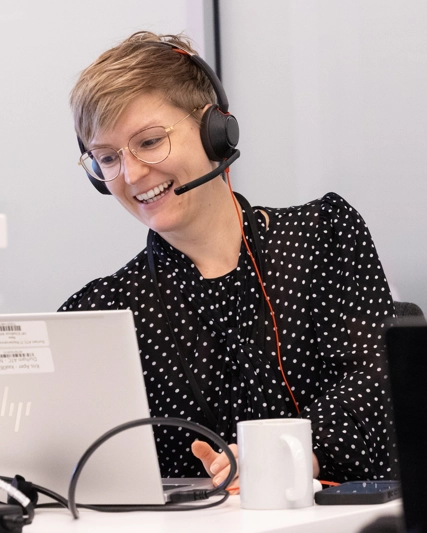Vaccines are one of the most effective public health interventions in history, second only to clean water.1 Despite this, CDC data shows that vaccination coverage among U.S. adults remains low and disparities by race and ethnicity and other demographic factors have persisted.2 The COVID-19 vaccine rollout revealed that racial and ethnic disparities in vaccination could be significantly reduced with the support of balanced communications from trusted messengers and data transparency. GSK’s COiMMUNITY Initiative aims to build upon the pandemic response to address disparity gaps.
Think local
While there are many barriers to adult immunization in the US, one way to begin closing the gaps in adult immunization is by understanding the specific needs and challenges of patients and healthcare providers at a community level.
Taking a localized approach with trusted sources helps in the effort to improve outreach and education efforts—reaching audiences where they are with the information they need to encourage better health outcomes.
That’s why, in 2023, as part of our COiMMUNITY Initiative, GSK granted $1 million in funding to ten innovative and ambitious projects led by non-profit organizations who know their communities best. These groups included:
- American Lung Association
- American Pharmacists Association (APhA)
- APhA Foundation
- Asian Health Coalition
- California Chronic Care Coalition
- Global Healthy Living Foundation
- Immunize Kansas Coalition
- Indiana Immunization Coalition
- Pharmacy Quality Alliance
- The Arizona Partnership for Immunization
If our goal is to get ahead of vaccine-preventable disease through widespread, equitable adult immunization, a one-size-fits-all approach simply won’t work. We need to support local organizations who can address the unique needs and gaps in their communities, and that’s precisely what these COiMMUNITY grants are all about.”
Three insights for improving adult immunization
To help foster collaboration and glean insights that might help other health advocacy groups who are doing similar work, GSK convened some of the COiMMUNITY grant recipients to share key learnings and challenges that arose from their work to improve adult immunization in 2024.*
Here are the insights they shared:
1. Meet People Where They Are
Get creative about where (and how) to show up in the community.
Hosting educational events in unconventional settings provides opportunities to find unique and inviting spaces where people naturally enjoy spending their time. The Immunize Kansas Coalition, in collaboration with Latinos Unidos for Vaccines, reached Latino communities in Kansas and Colorado about the importance of immunization and supported vaccination efforts by bringing the education to places where community members gather, including places of work, soccer games, mercados (Latino grocery stores) and palaterias (Mexican-style ice cream and snack shops). In addition, Latinos Unidos for Vaccines created “Vaccine Sundays” which engaged churches in community health and prevention information sharing, reaching over 9,000 older adults. They also hosted a “Day at the Capital,” where Latinos Unidos for Vaccines collaborated with other community organizations to host over 40 advocates at the Colorado State House and present immunization data to members of the legislature.
“To meet people where they are, sometimes you have to show up in unexpected places — places that wouldn’t typically be associated with immunization,” said Julissa Soto, CEO of Julissa Soto Latino Health Equity Consulting and Chair for Latinos Unidos for Vaccines.
The Global Healthy Living Foundation took a similar approach by launching a podcast series sharing informative, educational vaccination messaging in both English and Spanish. Specifically, the organization leveraged their content and storytelling format to target the dynamics of the multigenerational Latino household. Latinos continue to be among the most likely demographic groups to live in multigenerational households, often including two adjacent adult generations, such as parents and their adult children. This audio content helps support organic, empathetic conversation around prevention and immunization. Thus far, the podcast has garnered 75,000 listens across all platforms.
The American Lung Association (ALA) partnered with the Kentucky Immunization Coalition, Kentucky Rural Health Association, and the Kentucky Office of Rural Health to conduct a needs assessment with south-central Kentucky community health organizations to identify what really drives vaccine hesitancy, what educational gaps exist specific to vaccines, what motivates individuals to get vaccinated, and their perceived risk of getting sick from an infectious disease.
The Lung Association found that rural communities value protecting their family members, especially young children or older adults, which is a top motivator when it comes to receiving vaccines. With these findings, the organization built a vaccination education toolkit that includes tailored resources that community leaders can utilize when speaking with community members.
The American Pharmacists Association (APhA) reiterated the best practices shared, with Andi Clark, PharmD, Director, Corporate Alliances at APhA, noting, “The success stories we hear from our pharmacists involve getting into the community that they are serving. That means showing up to local churches, local public health departments, community clinics and health fairs to educate different populations and caregivers.”
2. Start with Education
Make patient awareness an ongoing priority.
Childhood vaccinations are typically administered on a consistent schedule during routine well-child visits at a pediatrician's office. In contrast, adult immunization is less likely to be considered a standard of care and may occur in healthcare settings outside of a physician’s office, like pharmacies or occupational health clinics.
“Many adults simply do not know that there are recommended vaccines for them, so providing education and answering questions is crucial for increasing vaccination rates,” said Lisa Robertson, Executive Director of the Indiana Immunization Coalition.
To that end, the Indiana Immunization Coalition has focused on fostering clear communication through trusted messengers to help adults in rural Indiana recognize that they might be missing the chance to protect themselves against infectious diseases. In addition, they say identifying trusted messengers for all types of communities is essential. For example, in rural communities where there may not be a local urgent care or a pharmacist accessible, the vaccine educator may be a school nurse.
Comparably, the California Chronic Care Coalition has concentrated on making resources available in multiple languages and putting them in the hands of leaders representing multiple religions. When it comes to reaching immunocompromised patients, they make sure to collaborate with trusted advisors, such as Looms for Lupus, to help personalize vaccination education from community members who know the issues best.
This sentiment was echoed by the Asian Health Coalition (AHC), who shared the importance of culturally and linguistically tailored efforts to increase health literacy towards building confidence and motivation. AHC collaborated with and trained community-based organizations (CBOs), using motivational interviewing techniques to empower Asian American and Pacific Islander communities to make the best individual, family and community-level decisions. AHC relied on the local expertise of their CBO partners to determine how best to disseminate information to meet the needs of each community.
3. Break Down Barriers
Understand what is standing in the way of prevention.
Although federal legislation has eliminated out-of-pocket costs for recommended vaccines among adults covered under Medicaid, Medicare Part D and most commercial insurance plans, uninsured or underinsured adults may still have to pay. On the provider side, it can be difficult to get reimbursed for vaccination, which may discourage clinics from stocking essential vaccines, and imposing extra steps for patients.
“Vaccine financing is a huge part of vaccine delivery,” said Jennifer Tinney, Program Director of The Arizona Partnership for Immunization (TAPI). “Insurance coverage can mean the difference between whether someone gets vaccinated or not, and when reimbursement issues get in the way of providers stocking vaccines, that can limit access.”
TAPI, in collaboration with the Arizona Department of Health Services Immunization Program, offer free training called T.I.P.S (Training on Immunization Practice Strategies) to improve immunization practices in public and private providers’ offices. This training covers immunization best practices, vaccine handling, state requirements, and the state immunization registry. Additionally, TAPI provides one-on-one support for medical practices and collaborates with “cultural brokers” such as medical assistants and vaccines coordinators to improve vaccine access, confidence and equity in underserved communities in Arizona.
Carrying the torch
Tackling the barriers to adult immunization is no easy task, but that is why our ambition at GSK is to get ahead of disease together.
With local collaboration, community partnerships and sustained funding, we have tremendous opportunities to build long-lasting solutions that can help increase education on recommended routine vaccination for adults in the US.
GSK remains dedicated to advancing adult immunization through local partnerships and funding. In 2024, GSK doubled its COiMMUNITY grants to $2 million, supporting organizations focused on adult immunization and health equity. Grant applications will be reviewed on a rolling basis until mid-November of 2024.
* The roundtable was held for information-sharing purposes among grant recipients. All work executed by COiMMUNITY grant recipients was done so independently without GSK oversight.
References
Institute of Medicine. CP Howson, et al. eds. Adverse Effects of Pertussis and Rubella Vaccines. Washington, DC: National Academy Press; 1991.
Vaccination coverage among adults in the United States, National Health Interview Survey, 2021.



